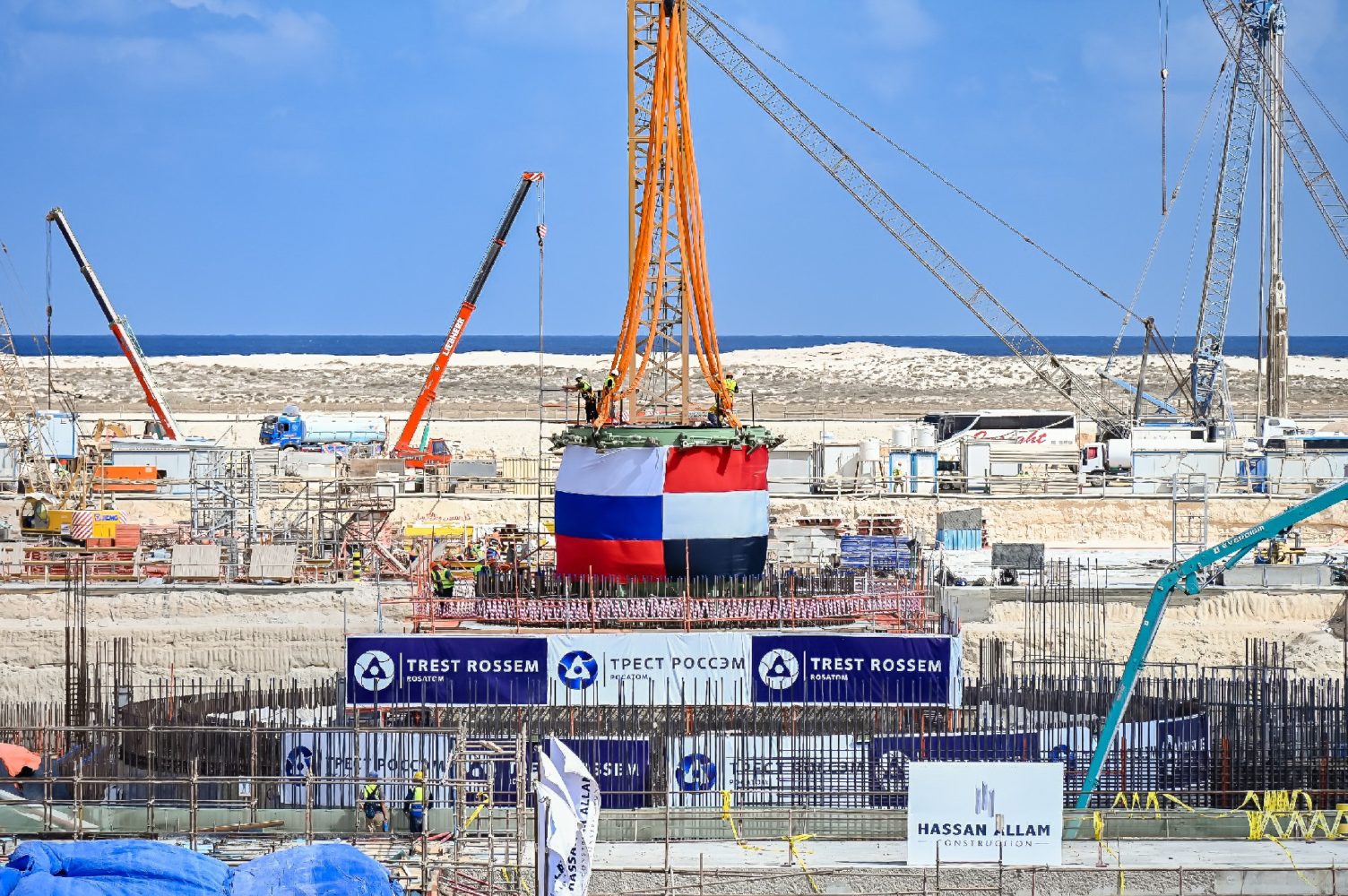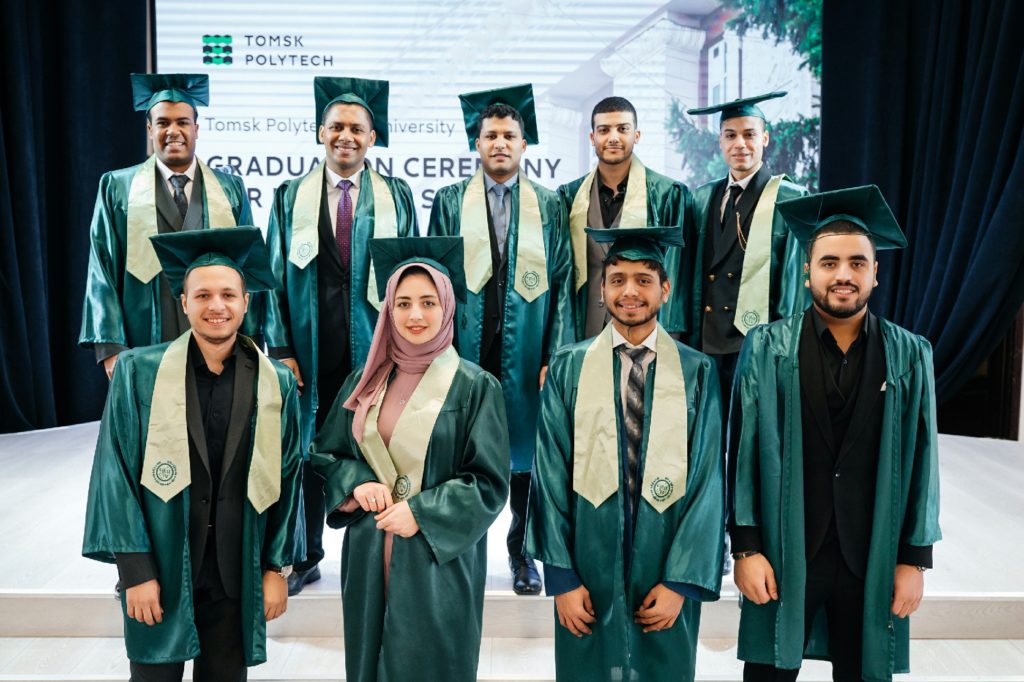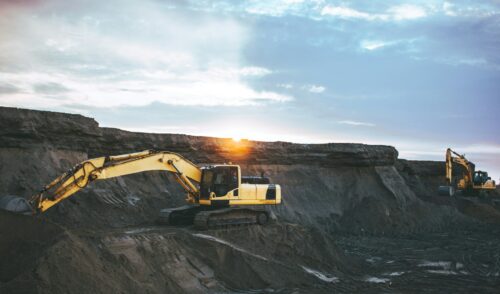
Year 2023 in Review
back to contentsIn the past year 2023, first concrete was poured twice at El Dabaa, for Unit 3 and Unit 4. Construction works at the first and second units continued at scale and at pace. We recall the key milestones passed by Egypt’s first nuclear power plant last year.
Construction
Egyptian companies are involved in the construction of El Dabaa. According to preliminary plans, the share of local contractors will reach 35 % during the construction of Unit 4. It is expected that there will be around 30,000 Egyptian workers employed on the site at the peak of construction of all four reactors.
March 2023 saw two major events. First, the Egyptian Nuclear and Radiological Regulatory Authority (ENRRA) issued a construction license for El Dabaa Unit 3 after a comprehensive on-site safety inspection. Second, the first piece of large-size equipment — a core catcher for El Dabaa Unit 1 — was delivered to the construction site from Russia. A know-how of Russian nuclear engineers, the core catcher is a steel cone-shaped vessel designed to hold fuel-containing material (corium) in case of a core meltdown accident.
In May, El Dabaa passed another milestone as first concrete was poured for the basemat of Unit 3.
In July, Rosatom Director General Alexey Likhachev, Minister of Electricity and Renewable Energy of Egypt Mohamed Shaker, and Chairman of the Board of the Egyptian Nuclear Power Plants Authority (NPPA) Amged El-Wakeel visited the construction site. They noted that the construction of the first three units of El Dabaa NPP was proceeding right on schedule.
In early August, NPPA organized an inspection visit to Unit 4 to check whether the site was ready for pouring the first concrete for the reactor island foundation slab. The inspection team included representatives of ENRRA and VO Bezopasnost. In late August, ENRRA issued a construction license for Unit 4.
In October, the installation of a core catcher began at the first unit of the plant. In November, the same operation started at Unit 2.
Education
Students from Egypt are taught in leading Russian universities and do practical courses at Rosatom’s training facilities. In February, the Tomsk Polytechnic University (TPU) and the Egyptian-Russian University awarded degrees to the fourth cohort of students who had taken a course in Design, Engineering and Operation of Nuclear Stations. The course was launched in 2014 under the auspices of Rosatom. The course takes 5.5 years to finish. During the first three years, students from Egypt study general scientific subjects in their home country. During the next 2.5 years, they study the fundamentals of physics and kinetics, neutronic calculations, and principles of nuclear design, engineering and operation at the TPU School of Energy and Power Engineering (Russia).

Egyptian engineers are also trained at the Leningrad NPP International Personnel Training Center in Russia. In 2023 alone, 90 individuals completed a training program there, with about another thousand people from the operating, maintenance and repair personnel of El Dabaa to improve their qualifications by 2027.
Business activity
Rosatom presented its healthcare products at the Pan-African Exhibition and Conference Africa Health ExCon 2023 held in June. Dedicated to the healthcare and pharma market, the exhibition brought together about 60,000 delegates and participants from more than 90 countries. Rosatom unveiled nuclear medicine products and solutions at its exhibition booth. Today, the Russian nuclear corporation is the world’s Top 5 supplier of isotopes for diagnostics and treatment of cancerous, cardiovascular, neurological and other diseases.
Rosatom manufactures and sells 16 types of proprietary medical equipment and offers a one-stop-shop solution for nuclear medicine infrastructure that meets all safety requirements, from design and construction of medical facilities to outfitting and medical staff training.
Rusatom RDS (part of Rosatom) and the Egyptian company Med Pharma Group signed an agreement on the sidelines of the exhibition. The parties agreed to expand scientific and technological cooperation and deploy Tianox-based nitrogen monoxide therapies at the Egyptian medical institutions.
In late December, Rosatom opened its flagship office in Cairo. This was an important step towards integrating the office infrastructure of Rosatom’s subsidiaries and promoting their products to the Egyptian market.
“We are confident that our cooperation with Egypt will bring significant results, contribute to the implementation of the country’s sustainable development program, support the achievement of Egypt’s ambitious goals, and assist its further progress,” Murad Aslanov, Director of Rosatom’s Office in Egypt, said at the opening ceremony.
El- Dabaa NPP is being built under an ЕРС (Engineering, Procurement and Construction) contract. This type of contract in the construction industry implies that the contractor is in charge of the entire scope of work, from engineering design to construction and commissioning.
When all four reactors of El Dabaa are put in operation, its installed capacity will be 4,800 MW. El Dabaa NPP will supply over 20 million of Egyptians (19 % of Egypt’s total population) with electricity and the share of low-carbon energy sources in the country will reach 22 %, while CO2 emissions will decrease by 7 % from the current level.




